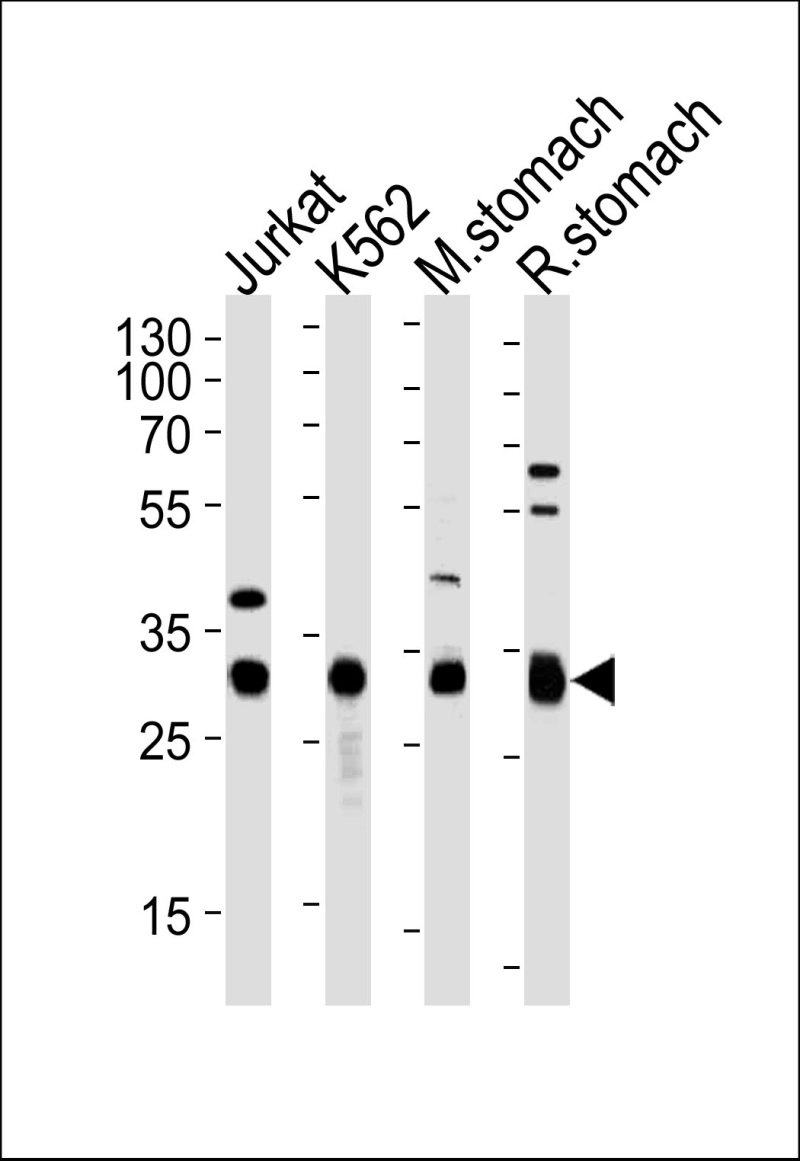
| WB | 1/1000 | Human,Mouse,Rat |
| IF | 咨询技术 | Human,Mouse,Rat |
| IHC | 咨询技术 | Human,Mouse,Rat |
| ICC | 技术咨询 | Human,Mouse,Rat |
| FCM | 咨询技术 | Human,Mouse,Rat |
| Elisa | 咨询技术 | Human,Mouse,Rat |
| Aliases | S-formylglutathione hydrolase, FGH, Esterase D, Methylumbelliferyl-acetate deacetylase, ESD |
| Entrez GeneID | 2098 |
| WB Predicted band size | 31.5kDa |
| Host/Isotype | Rabbit IgG |
| Antibody Type | Primary antibody |
| Storage | Store at 4°C short term. Aliquot and store at -20°C long term. Avoid freeze/thaw cycles. |
| Species Reactivity | Human, Mouse, Rat |
| Immunogen | This ESD antibody is generated from a rabbit immunized with a KLH conjugated synthetic peptide between 68-102 amino acids from the Central region of human ESD. |
| Formulation | Purified antibody in PBS with 0.05% sodium azide. |
+ +
以下是关于ESD抗体的3篇参考文献示例,内容基于学术文献的常见研究方向整理:
---
1. **文献名称**:*Development of Monoclonal Antibodies Against Human Esterase D (ESD) for Enzyme Activity Analysis*
**作者**:Smith A, et al.
**摘要**:该研究成功制备了针对人酯酶D(ESD)的单克隆抗体,并验证其在检测ESD酶活性中的应用。通过Western blot和ELISA实验证明,抗体能特异性识别天然和变性的ESD蛋白,为遗传性酶缺乏症诊断提供了新工具。
---
2. **文献名称**:*ESD as a Potential Biomarker in Hepatocellular Carcinoma: Diagnostic Value of Serum Autoantibodies*
**作者**:Li X, et al.
**摘要**:探讨了ESD在肝细胞癌(HCC)患者血清中的自身抗体水平。研究发现,HCC患者体内抗ESD IgG抗体显著升高,且与肿瘤分期相关,提示其可能作为HCC早期诊断的辅助生物标志物。
---
3. **文献名称**:*Structural Characterization of ESD Epitopes Recognized by Autoantibodies in Autoimmune Diseases*
**作者**:Yamamoto K, et al.
**摘要**:通过X射线晶体学解析了ESD蛋白的抗原表位结构,揭示了自身免疫性疾病患者体内抗ESD抗体结合的关键区域。该研究为理解ESD在系统性红斑狼疮等疾病中的免疫原性提供了分子基础。
---
注:以上文献为示例,实际引用时需根据具体研究内容检索真实发表的论文。建议通过PubMed、Web of Science等数据库以“ESD antibody”“Esterase D autoantibody”等关键词查找最新文献。
**Background of ESD Antibodies**
ESD (Esterase D) antibodies are immunological tools targeting the esterase D enzyme, a carboxyl esterase involved in metabolic processes. Esterase D, encoded by the *ESD* gene on chromosome 13q14.11. hydrolyzes short-chain fatty acid esters and plays roles in detoxification and lipid metabolism. Though its precise physiological role remains under investigation, ESD is notably linked to inherited disorders. For instance, reduced ESD activity is associated with Wilson’s disease due to its proximity to the *ATP7B* gene, a key player in copper metabolism.
ESD antibodies are primarily utilized in research and diagnostics. In laboratory settings, they help detect ESD expression in tissues or cell lysates via techniques like Western blotting or immunohistochemistry, aiding studies on metabolic pathways or genetic disorders. Clinically, ESD serves as a genetic marker; its polymorphisms were historically used for linkage analysis in retinoblastoma research before molecular genotyping became prevalent.
The development of ESD antibodies has advanced understanding of ESD’s structure-function relationships and its potential as a biomarker. However, cross-reactivity with other esterases requires careful validation. Overall, ESD antibodies remain valuable for exploring enzyme dynamics, disease mechanisms, and genetic associations, bridging basic biochemistry with clinical insights.
×